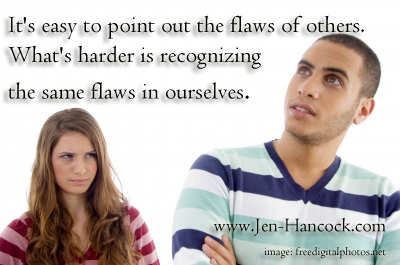No one is a saint and we all need to check our behavior from time to time.

I have been doing some training for a company and one of the issues that comes up, is that they want to help their high performing staff learn how to be less abrasive with others. How can they use this information to do that?
One is to ensure that the people on the receiving end of employee on employee aggression are supported, the other is to support the aggressor to help them learn a more effective way of being in the office.
One of the things I emphasize when I do these sorts of training is that we are all responsible for being professional and civil and that if a co-worker starts issuing deltas to you to get you to stop doing something they find objectionable, that you should take that as constructive criticism.
This is hard to do because we often aren’t even aware that we are overstepping our bounds and hurting or scaring other people. I myself am guilty of this and have been told that at times I am terrifying. This is hard for me to hear because I’m really a pussycat. I would never intentionally hurt someone.
Good Intentions Aren’t ENOUGH
My good intentions don’t always mean I succeed. I don’t know the history or the triggers of everyone I work with. I have no idea what their tolerances are for loud noises or fierce faces. I don’t always realize when I am explaining something that I am doing it in a way that is condescending. I don’t always realize when working on deadline that my sense of urgency may be experienced as intimidation as others. What I intend and what other people experience are sometimes two completely different things.
Recognizing that helps me to be a better person and a more effective person. When someone tells me I am out of line, I apologize. I may not have meant to, but that doesn’t matter. To them, I stepped over a boundary and that’s what matters. My job is to learn where their boundaries are and learn to respect them despite my natural inclinations to do otherwise. To me, that is what being a professional is about.
It’s not about subverting myself or changing the core of who I am. It’s about modulating who I am for different audiences and situations. My strengths are also weaknesses depending on the situation. By learning to be flexible in how I present myself and my ideas and my needs, I learn how to be effective with different people, in different situations. This makes me even stronger and more effective.
So the next time you find yourself being told you are behaving badly apologize. Sincerely. It isn’t about who is right. It’s about understanding and respecting your fellow humans enough to respect their needs.
Learning to Behave Better
Here is what I have learned from accepting that I am not as wonderful as I think I am.
1) This gets easier. As you practice letting go of your ego, you find that what you thought you were protecting in your ego, was holding you back. By letting go, you grow and become better.
2) I no longer have to blame others when I am I not able to accomplish what I want. If I fail to get others to do what I need them to do, the blame lies with me. I have learned that if I am not being effective with other people, and I tweak what I am doing and how I am presenting myself, I get better results. At the end of the day, I would rather be effective than right. The result is that I am more effective and have less failures and so less opportunity to rationalize.
3) I am happier. Being self-righteous might feel good in the moment, but it’s based on anger. Self-righteous anger and anger is not a pleasant emotion to feel. I find that when I accept criticism of my behavior as constructive and get my ego out of the way, I no longer respond in self-righteous anger and so – I’m way less angry. I found that when I combine the lack of anger with a genuine concern to improve so that I can be a better person, I feel better about myself.
4) I spend less time on pointless ego maintenance. I might occasionally still be a jerk accidentally, but I try not to compound that by being an even bigger jerk to prove I wasn’t a jerk. That is not only insanely stupid, it’s exhausting. It’s much easier to just accept – ok – I was a jerk. Apologize and try not to do whatever it was in the future. The amount of energy we all spend protecting our ego and then not changing and improving ourselves is astounding.
The benefits of admitting your bad behavior is immense. The only thing worse than being wrong is to continue to be wrong out of pride. So IF you have behave badly, even if you didn’t mean to. Own up to it and learn from it and work on being a better person. You may just find that you are more effective as a result.
It’s Time to Change
And if you want to embark on a self-change initiative – check out my course – why is change so hard – which will help you understand why, despite your desire to change, you struggle, so that you don’t allow you instincts to derail your progress. https://humanistlearning.com/change1/
